高中英语反义疑问句的讲解介绍.doc
- 格式:doc
- 大小:92.50 KB
- 文档页数:8
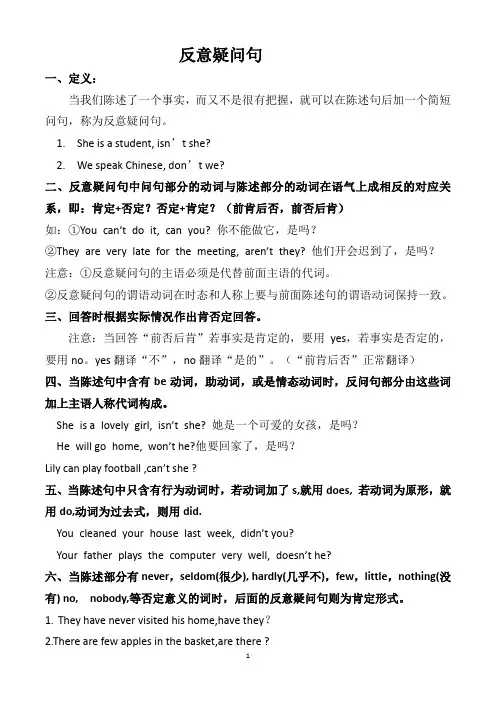
反意疑问句一、定义:当我们陈述了一个事实,而又不是很有把握,就可以在陈述句后加一个简短问句,称为反意疑问句。
1. She is a student, isn’t she?2. We speak Chinese, don’t we?二、反意疑问句中问句部分的动词与陈述部分的动词在语气上成相反的对应关系,即:肯定+否定?否定+肯定?(前肯后否,前否后肯)如:①You can’t do it,can you?你不能做它,是吗?②They are very late for the meeting,aren’t they?他们开会迟到了,是吗?注意:①反意疑问句的主语必须是代替前面主语的代词。
②反意疑问句的谓语动词在时态和人称上要与前面陈述句的谓语动词保持一致。
三、回答时根据实际情况作出肯否定回答。
注意:当回答“前否后肯”若事实是肯定的,要用yes,若事实是否定的,要用no。
yes翻译“不”,no翻译“是的”。
(“前肯后否”正常翻译)四、当陈述句中含有be动词,助动词,或是情态动词时,反问句部分由这些词加上主语人称代词构成。
She is a lovely girl,isn’t she?她是一个可爱的女孩,是吗?He will go home,won’t he?他要回家了,是吗?Lily can play football ,can’t she ?五、当陈述句中只含有行为动词时,若动词加了s,就用does,若动词为原形,就用do,动词为过去式,则用did.You cleaned your house last week,didn’t you?Your father plays the computer very well,doesn’t he?六、当陈述部分有never,seldom(很少), hardly(几乎不),few,little,nothing(没有) no, nobody,等否定意义的词时,后面的反意疑问句则为肯定形式。
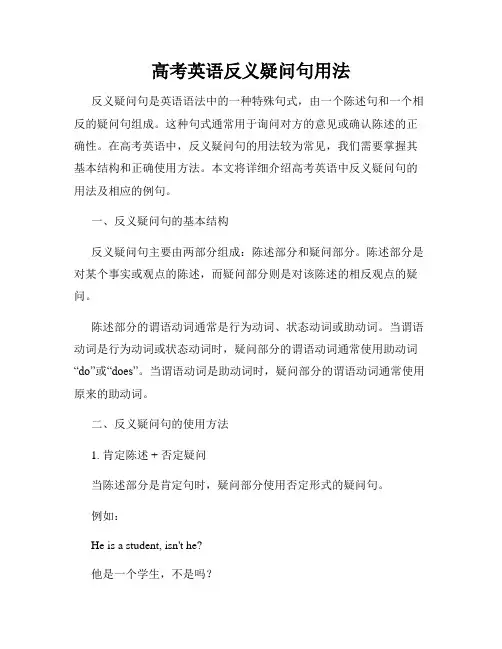
高考英语反义疑问句用法反义疑问句是英语语法中的一种特殊句式,由一个陈述句和一个相反的疑问句组成。
这种句式通常用于询问对方的意见或确认陈述的正确性。
在高考英语中,反义疑问句的用法较为常见,我们需要掌握其基本结构和正确使用方法。
本文将详细介绍高考英语中反义疑问句的用法及相应的例句。
一、反义疑问句的基本结构反义疑问句主要由两部分组成:陈述部分和疑问部分。
陈述部分是对某个事实或观点的陈述,而疑问部分则是对该陈述的相反观点的疑问。
陈述部分的谓语动词通常是行为动词、状态动词或助动词。
当谓语动词是行为动词或状态动词时,疑问部分的谓语动词通常使用助动词“do”或“does”。
当谓语动词是助动词时,疑问部分的谓语动词通常使用原来的助动词。
二、反义疑问句的使用方法1. 肯定陈述 + 否定疑问当陈述部分是肯定句时,疑问部分使用否定形式的疑问句。
例如:He is a student, isn't he?他是一个学生,不是吗?2. 否定陈述 + 肯定疑问当陈述部分是否定句时,疑问部分使用肯定形式的疑问句。
例如:She doesn't speak French, does she?她不会说法语,对吗?3. 陈述部分有实义动词如果陈述部分有实义动词(非助动词),则疑问部分使用助动词“do”或“does”。
例如:They like playing basketball, don't they?他们喜欢打篮球,对吗?4. 陈述部分有助动词如果陈述部分有助动词,则疑问部分使用原来的助动词。
例如:You can swim, can't you?你会游泳,对吗?5. 以let's开头的陈述句以let's开头的陈述句,疑问部分使用shall we。
例如:Let's go to the park, shall we?我们去公园吧,好吗?三、高考英语中的应用示例1. 完成句子The weather is nice today, ________?天气今天不错,是吗?2. 完成句子Tom isn't coming to the party, ________?汤姆不来参加聚会,是吗?3. 完成句子She will never forget this experience, ________?她永远不会忘记这个经历,对吗?4. 完成句子They have already finished their homework, ________?他们已经完成作业了,是吗?5. 完成句子Let's study harder for the exam, ________?让我们更努力地为考试学习,好吗?总结:反义疑问句是高考英语中的常见语法现象,掌握好其基本结构和正确使用方法对于理解和运用该句式非常重要。
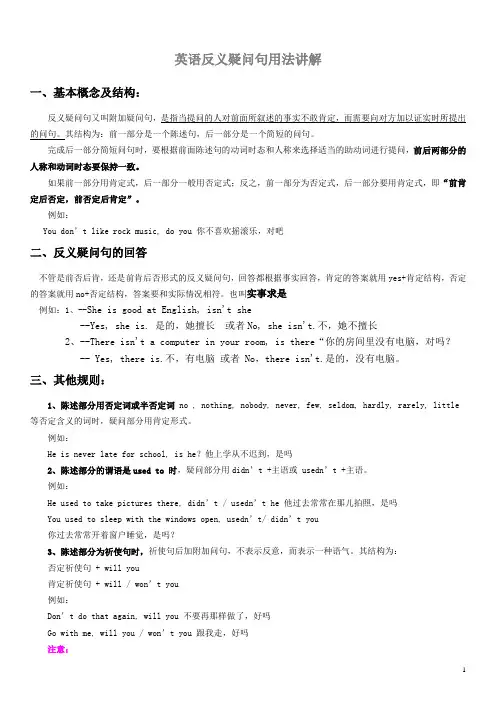
英语反义疑问句用法讲解一、基本概念及结构:反义疑问句又叫附加疑问句,是指当提问的人对前面所叙述的事实不敢肯定,而需要向对方加以证实时所提出的问句。
其结构为:前一部分是一个陈述句,后一部分是一个简短的问句。
完成后一部分简短问句时,要根据前面陈述句的动词时态和人称来选择适当的助动词进行提问,前后两部分的人称和动词时态要保持一致。
如果前一部分用肯定式,后一部分一般用否定式;反之,前一部分为否定式,后一部分要用肯定式,即“前肯定后否定,前否定后肯定”。
例如:You don’t like rock music, do you 你不喜欢摇滚乐,对吧二、反义疑问句的回答不管是前否后肯,还是前肯后否形式的反义疑问句,回答都根据事实回答,肯定的答案就用yes+肯定结构,否定的答案就用no+否定结构,答案要和实际情况相符。
也叫实事求是例如:1、--She is good at English, isn't she--Yes, she is. 是的,她擅长或者No, she isn't.不,她不擅长2、--There isn't a computer in your r oom, is there“你的房间里没有电脑,对吗?-- Yes, there is.不,有电脑或者 No,there isn't.是的,没有电脑。
三、其他规则:1、陈述部分用否定词或半否定词 no , nothing, nobody, never, few, seldom, hardly, rarely, little 等否定含义的词时,疑问部分用肯定形式。
例如:He is never late for school, is he?他上学从不迟到,是吗2、陈述部分的谓语是used to 时,疑问部分用didn’t +主语或 usedn’t +主语。
例如:He used to take pictures there, didn’t / usedn’t he 他过去常常在那儿拍照,是吗You used to sleep with the windows open, usedn’t/ didn’t you你过去常常开着窗户睡觉,是吗?3、陈述部分为祈使句时,祈使句后加附加问句,不表示反意,而表示一种语气。
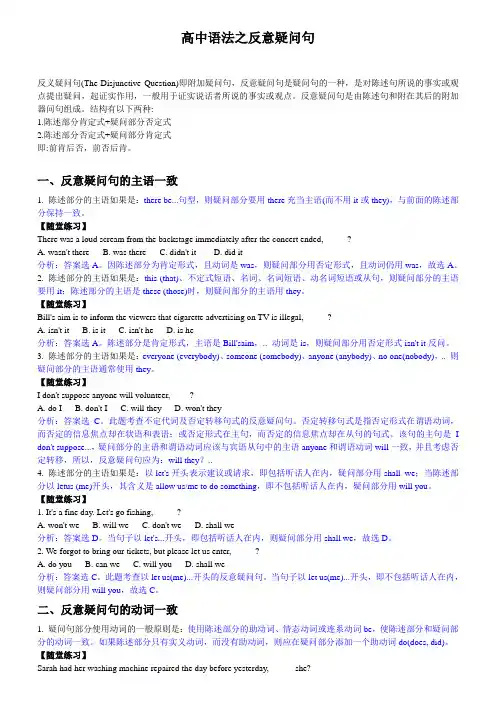
高中语法之反意疑问句反义疑问句(The Disjunctive Question)即附加疑问句,反意疑问句是疑问句的一种,是对陈述句所说的事实或观点提出疑问,起证实作用,一般用于证实说话者所说的事实或观点。
反意疑问句是由陈述句和附在其后的附加器问句组成。
结构有以下两种:1.陈述部分肯定式+疑问部分否定式2.陈述部分否定式+疑问部分肯定式即:前肯后否,前否后肯。
一、反意疑问句的主语一致1. 陈述部分的主语如果是:there be...句型,则疑问部分要用there充当主语(而不用it或they),与前面的陈述部分保持一致。
【随堂练习】There was a loud scream from the backstage immediately after the concert ended, _____?A. wasn't thereB. was thereC. didn't itD. did it分析:答案选A。
因陈述部分为肯定形式,且动词是was,则疑问部分用否定形式,且动词仍用was,故选A。
2. 陈述部分的主语如果是:this (that)、不定式短语、名词、名词短语、动名词短语或从句,则疑问部分的主语要用it;陈述部分的主语是these (those)时,则疑问部分的主语用they。
【随堂练习】Bill's aim is to inform the viewers that cigarette advertising on TV is illegal, _____?A. isn't itB. is itC. isn't heD. is he分析:答案选A。
陈述部分是肯定形式,主语是Bill'saim,.. 动词是is,则疑问部分用否定形式isn't it反问。
3. 陈述部分的主语如果是:everyone (everybody)、someone (somebody)、anyone (anybody)、no one(nobody),.. 则疑问部分的主语通常使用they。

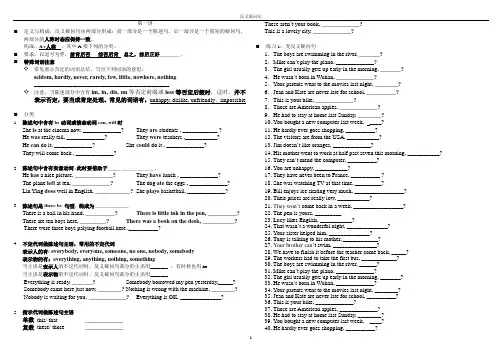
第一讲⏹定义与构成:反义疑问句由两部分组成:前一部分是一个陈述句,后一部分是一个简短的疑问句,两部分的人称时态应保持一致。
构成:A+人称,其中A指下列的分类。
⏹要求,以逗号为界,前肯后否前否后肯总之,前后正好________ .⏹特殊词语注意✧常见表示否定的词语总结,写出下列词语的意思:seldom, hardly, never, rarely, few, little, nowhere, nothing_____________________________________________________✧注意,当陈述部分中含有im, in, dis, un等否定前缀或less等否定后缀时,这时,并不表示否定,要当成肯定处理。
常见的词语有,unhappy, dislike, unfriendly,impossible⏹分类1.陈述句中含有be动词或情态动词can, will时She is at the cinema now, _____________? They are students , ____________ ?He was really tall, _____________? They were teachers ,___________?He can do it, _____________? She could do it , _____________?They will come back , _____________?2.陈述句中含有实意动词 :此时要借助于_____ ______ ______ .He has a nice picture, _____________? They have lunch , _____________?The plane left at ten, _____________? The dog ate the eggs , _____________?Lin Ying does well in English, ____________? She plays basketball, _____________?3.陈述句是there be 句型,构成为 _____________There is a ball in his hand, __________? There is little ink in the pen, __________?There are ten boys here, _________? There was a book on the desk, ___________?There were three boys palying football here ,__________?4.不定代词做陈述句主语,常用的不定代词表示人的有: everybody, everyone, someone, no one, nobody, somebody表示物的有:everything, anything, nothing, something当主语是表示人的不定代词时,反义疑问句部分的主语用_______ ,有时候也用he .当主语是表示物的不定代词时,反义疑问句部分的主语用_______ .Everything is ready, _______? Somebody borrowed my pen yesterday,_____?Somebody came here just now, ________? Nothing is wrong with the machine, ________?Nobody is waiting for you, _____________? Everything is OK, ______________?5.指示代词做陈述句主语单数this/ that _____________复数these/ those _____________These aren’t your book, _____________?This is a lovely city, _____________?⏹练习1:变反义疑问句1.The boys are swimming in the river, _______?2.Mike can’t play the piano, _____________?3.The girl usually gets up early in the morning, _______?4.He wasn’t born in Wuhan, _____________?5.Your parents went to the movies last night, ________?6.Jean and Kate are never late for school, __________?7.This is your bike, _____________?8.Those are American apples, _____________?9.He had to stay at home last Sunday, ________?10.You bought a new computer last week, ____?11.He hardly ever goes shopping, __________?12.The visitors are from the USA, ___________?13.Jim doesn’t like oranges, _____________?14.His mother went to work at half past seven this morning, ___________?15.They can’t mend the computer, __________?16.You are unhappy, ___________?17.They have never been to France, __________ ?18.She was watching TV at that time, _________?19.Bill enjoys ice skating very much, _________________?20.Their prices are really low, ___________?21.They won’t come back in a week, _________________?22.The pen is yours, _________23.Lucy likes English, ___________?24.That wasn’t a wonderful night, ______________?25.Your sister helped him, ______________?26.Tony is talking to his mother, ____________?27.Your brother can’t swim, _______________?28.We have to finish it before the teacher come back, _____?29.The workers had to take the first bus, ____________?30.The boys are swimming in the river, ______?31.Mike can’t play the piano, _____________?32.The girl usually gets up early in the morning, _______?33.He wasn’t born in Wuhan, _____________?34.Your parents went to the movies last night, ________?35.Jean and Kate are never late for school, __________?36.This is your bike, _____________?37.Those are American apples, _____________?38.He had to stay at home last Sunday, ________?39.You bought a new computer last week, ____?40.He hardly ever goes shopping, __________?42.Jim doesn’t like oranges, _____________?43.His mother went to work at half past seven this morning, ___________?44.They can’t mend the computer, __________?45.You are unhappy, ___________?46.They have never been to France, __________ ?47.She was watching TV at that time, _________?⏹练习2:选择1. Everything seems all right, _____ ?A. does itB. don’t theyC. won’t itD. doesn’t it2. He has never ridden a horse before, ___?A. does heB. has heC. hasn’t heD. doesn’t he3. Linda ate nothing this morning, ___?A. didn’t sheB. was sheC. did sheD. wasn’t she4. They cut the trees , _____?(A) don't they (B) didn't they (C) did they (D) do they5. His sister had a bad cough, ________ she?(A) wasn't (B) doesn't (C) hadn't ( D) didn't6. John can hardly understand any Chinese, _______ he?(A) can't (B) doesn't (C) can (D) does7. They could hardly believe the news, _____?A. couldn’t theyB. could theyC. did theyD. didn’t they第二讲6.祈使句一:一个特殊情况Let’s →shall we ? 其余都用______ ?不论肯定与否定。
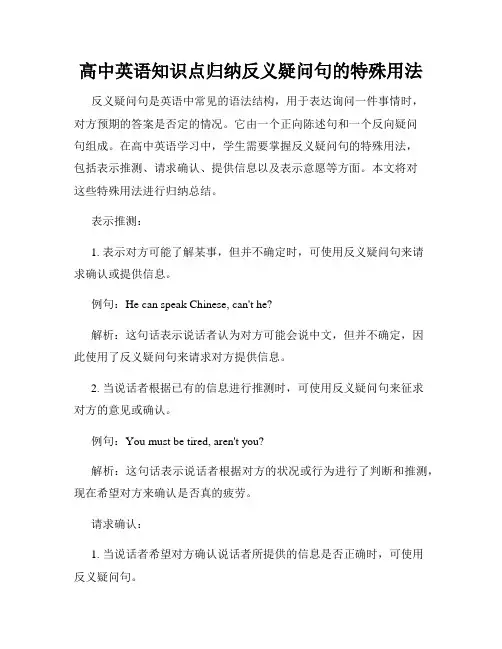
高中英语知识点归纳反义疑问句的特殊用法反义疑问句是英语中常见的语法结构,用于表达询问一件事情时,对方预期的答案是否定的情况。
它由一个正向陈述句和一个反向疑问句组成。
在高中英语学习中,学生需要掌握反义疑问句的特殊用法,包括表示推测、请求确认、提供信息以及表示意愿等方面。
本文将对这些特殊用法进行归纳总结。
表示推测:1. 表示对方可能了解某事,但并不确定时,可使用反义疑问句来请求确认或提供信息。
例句:He can speak Chinese, can't he?解析:这句话表示说话者认为对方可能会说中文,但并不确定,因此使用了反义疑问句来请求对方提供信息。
2. 当说话者根据已有的信息进行推测时,可使用反义疑问句来征求对方的意见或确认。
例句:You must be tired, aren't you?解析:这句话表示说话者根据对方的状况或行为进行了判断和推测,现在希望对方来确认是否真的疲劳。
请求确认:1. 当说话者希望对方确认说话者所提供的信息是否正确时,可使用反义疑问句。
例句:You understand, don't you?解析:这句话表示说话者希望对方确认自己所说的内容是否被理解。
2. 当说话者希望对方重复确认某个问题时,也可以使用反义疑问句。
例句:You are coming to the party, aren't you?解析:这句话表示说话者希望对方确认是否会参加派对,并希望得到对方的回答。
提供信息:1. 当说话者希望提供某个事实或消息,并希望对方确认或接受时,可使用反义疑问句。
例句:The concert is at 8 o'clock, isn't it?解析:这句话表示说话者希望对方确认音乐会的时间,并期待对方肯定地接受。
2. 当说话者希望提供有关自己或他人的信息,并期待对方提出问题时,也可以使用反义疑问句。
例句:She is from France, isn't she?解析:这句话表示说话者提供了有关某人的国籍信息,并期待对方针对这个信息提出问题,比如询问她会不会说法语等。

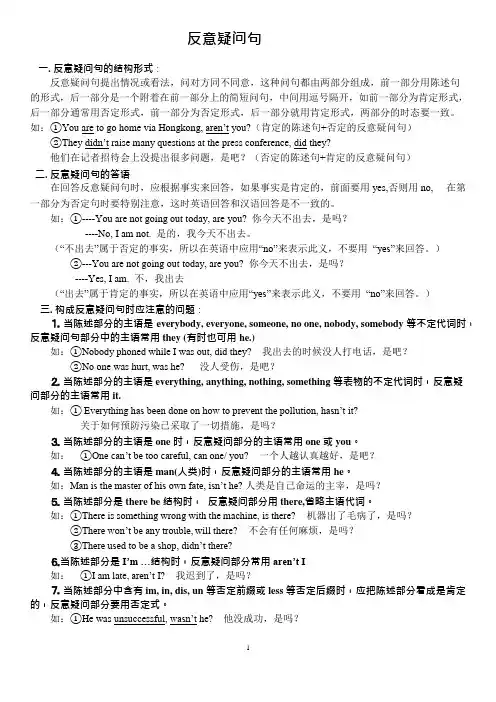
反意疑问句一. 反意疑问句的结构形式:反意疑问句提出情况或看法,问对方同不同意,这种问句都由两部分组成,前一部分用陈述句的形式,后一部分是一个附着在前一部分上的简短问句,中间用逗号隔开,如前一部分为肯定形式,后一部分通常用否定形式,前一部分为否定形式,后一部分就用肯定形式,两部分的时态要一致。
如:①You are to go home via Hongkong, aren’t you?(肯定的陈述句+否定的反意疑问句)②They didn’t raise many questions at the press conference, did they?他们在记者招待会上没提出很多问题,是吧?(否定的陈述句+肯定的反意疑问句)二. 反意疑问句的答语在回答反意疑问句时,应根据事实来回答,如果事实是肯定的,前面要用yes,否则用no, 在第一部分为否定句时要特别注意,这时英语回答和汉语回答是不一致的。
如:①----You are not going out today, are you? 你今天不出去,是吗?----No, I am not. 是的,我今天不出去。
(“不出去”属于否定的事实,所以在英语中应用“no”来表示此义,不要用“yes”来回答。
)②---You are not going out today, are you? 你今天不出去,是吗?----Yes, I am. 不,我出去(“出去”属于肯定的事实,所以在英语中应用“yes”来表示此义,不要用“no”来回答。
)三. 构成反意疑问句时应注意的问题:⒈当陈述部分的主语是everybody, everyone, someone, no one, nobody, somebody 等不定代词时,反意疑问句部分中的主语常用they (有时也可用he.)如:①Nobody phoned while I was out, did they? 我出去的时候没人打电话,是吧?②No one was hurt, was he? 没人受伤,是吧?⒉当陈述部分的主语是everything, anything, nothing, something 等表物的不定代词时,反意疑问部分的主语常用it.如:① Everything has been done on how to prevent the pollution, hasn’t it?关于如何预防污染已采取了一切措施,是吗?⒊当陈述部分的主语是one 时,反意疑问部分的主语常用one 或you。
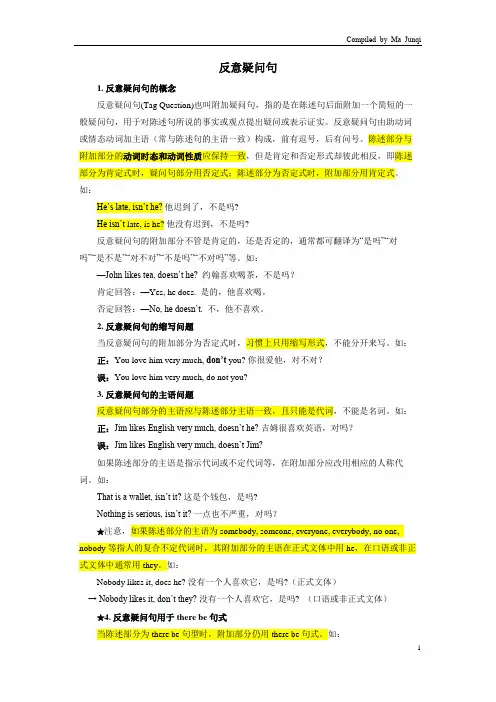
反意疑问句1. 反意疑问句的概念反意疑问句(Tag Question)也叫附加疑问句,指的是在陈述句后面附加一个简短的一般疑问句,用于对陈述句所说的事实或观点提出疑问或表示证实。
反意疑问句由助动词或情态动词加主语(常与陈述句的主语一致)构成,前有逗号,后有问号。
陈述部分与附加部分的动词时态和动词性质应保持一致,但是肯定和否定形式却彼此相反,即陈述部分为肯定式时,疑问句部分用否定式;陈述部分为否定式时,附加部分用肯定式。
如:He’s late, isn’t he?他迟到了,不是吗?He isn’t late, is he? 他没有迟到,不是吗?反意疑问句的附加部分不管是肯定的,还是否定的,通常都可翻译为“是吗”“对吗”“是不是”“对不对”“不是吗”“不对吗”等。
如:—John likes tea, doesn’t he? 约翰喜欢喝茶,不是吗?肯定回答:—Yes, he does. 是的,他喜欢喝。
否定回答:—No, he doesn’t. 不,他不喜欢。
2. 反意疑问句的缩写问题当反意疑问句的附加部分为否定式时,习惯上只用缩写形式,不能分开来写。
如:正:You love him very much, don’t you? 你很爱他,对不对?误:You love him very much, do not you?3. 反意疑问句的主语问题反意疑问句部分的主语应与陈述部分主语一致,且只能是代词,不能是名词。
如:正:Jim likes English very much, doesn’t he?吉姆很喜欢英语,对吗?误:Jim likes English very much, doesn’t Jim?如果陈述部分的主语是指示代词或不定代词等,在附加部分应改用相应的人称代词。
如:That is a wallet, isn’t it?这是个钱包,是吗?Nothing is serious, isn’t it?一点也不严重,对吗?★注意,如果陈述部分的主语为somebody, someone, everyone, everybody, no one, nobody等指人的复合不定代词时,其附加部分的主语在正式文体中用he,在口语或非正式文体中通常用they。
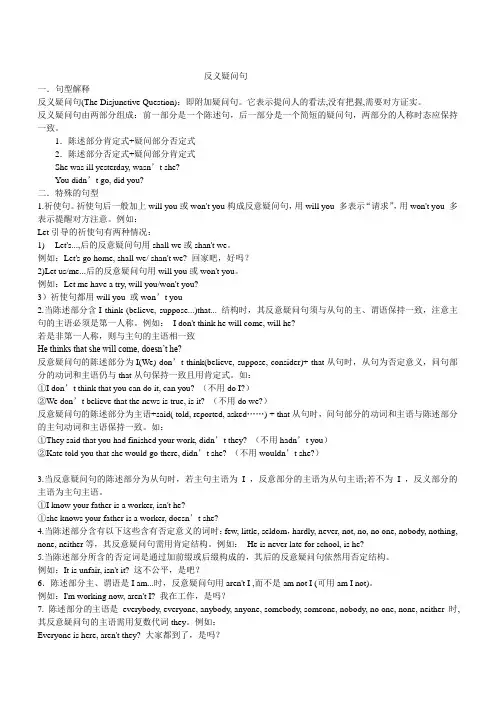
反义疑问句一.句型解释反义疑问句(The Disjunctive Question):即附加疑问句。
它表示提问人的看法,没有把握,需要对方证实。
反义疑问句由两部分组成:前一部分是一个陈述句,后一部分是一个简短的疑问句,两部分的人称时态应保持一致。
1.陈述部分肯定式+疑问部分否定式2.陈述部分否定式+疑问部分肯定式She was ill yesterday, wasn’t she?You didn’t go, did you?二.特殊的句型1.祈使句。
祈使句后一般加上will you或won't you构成反意疑问句,用will you 多表示“请求”,用won't you 多表示提醒对方注意。
例如:Let引导的祈使句有两种情况:1) Let's...,后的反意疑问句用shall we或shan't we。
例如:Let's go home, shall we/ shan't we? 回家吧,好吗?2)Let us/me...后的反意疑问句用will you或won't you。
例如:Let me have a try, will you/won't you?3)祈使句都用will you 或won’t you2.当陈述部分含I think (believe, suppose...)that... 结构时,其反意疑问句须与从句的主、谓语保持一致,注意主句的主语必须是第一人称。
例如:I don't think he will come, will he?若是非第一人称,则与主句的主语相一致He thinks that she will come, doesn’t he?反意疑问句的陈述部分为I(We) don’t think(believe, suppose, consider)+ that从句时,从句为否定意义,问句部分的动词和主语仍与that从句保持一致且用肯定式。
高中英语反义疑问句的讲解介绍想要哟学好英语,学生就要知道英语的语法,下面店铺的小编将为大家带来关于高中英语反义疑问句的讲解街介绍,希望能够帮助到大家。
高中英语反义疑问句的讲解一.概念反意疑问句是附加在陈述句之后,对陈述句所表示的事实或观点提出疑问的句子.附加疑问实际上是一种简略的一般疑问句。
二.相关知识点精讲1.反意疑问句的结构:陈述句(主语+谓语),+助动词/情态动词/be动词+主语(代词形式)?说明:陈述句部分如果是肯定句,反意疑问句,疑问句部分的助动词/情态动词/be动词+not (否定提问);如果陈述句部分是否定句,反意疑问句,疑问句部分用肯定式提问。
例句:He is your teacher, isnt he ?People shouldnt drop litter on the pavements, should they ?You found the key in the bedroom, didnt you ?They have a house in town, havent they ?/dont they ?The boy has to clean his room, doesnt he ?I am right, arent I ?Theyd rather go by bus, wouldnt they ?Youd better change your wet skirt, hadnt you ?Hed like to join our discussion, wouldnt he ?She ought to see a doctor at once, shouldnt she ? / oughtnt she ?I wish to say a few words, may I ?Thats nice, isnt it ?This is the place, isnt it ?Everybody knows the answer, dont they ?Nothing is serious, isnt it?There wasnt enough time at that moment, was there ?There used to a tower here, usednt there? / didnt there ?What you need is more practice, isnt it ?2.某些特殊句型的反意疑问句:1)祈使句的反意疑问句:表示肯定意义的祈使句,即表示请求,提示它的反意疑问句用will you 表达:有时也可以用wont you 表示。
反义疑问句1.陈述部分的主语是this, that时,疑问部分的主语多用it;陈述部分的主语是these, those时,疑问部分的主语多用theyThis is a dictionary, isn’t it? Those are shelves, aren’t they?2.当陈述部分是there be结构,疑问部分用there做主语There will not be any trouble, will there?3.陈述部分有neither, none, nobody, nothing, few, little, never, hardly, seldom否定词在句中,后面用肯定疑问句短语构成反义疑问句。
Neither of you will have coffee, will you?Nobody understood his speech, did they?4.陈述部分主语是everyone, everybody, someone, somebody, no one, nobody, anybody,anyone等不定代词,其反义疑问部分的主语可用he,也可以用they5.陈述部分主语是one,反义疑问句的主语可用one或he6.陈述部分主语是something, everything, nothing, anything 等不定代词做主语时,反义疑问句的主语要用it7.当主句主语为第一人称时,动词为suppose, think, believe, suspect, imagine, guess时其后面的翻译疑问句的主语则应与宾语从句的主语一致I don’t think you can do these exercises alone, can you?当主句主语为二三人称,其后的反义疑问句的主语则应与主句的主语一致Y ou thought they could have completed the project, didn’t you?8.当陈述部分是并列句,反义疑问句部分和第二分句相匹配Mary is a good girl but she often comes to school late, doesn’t she?9.翻译疑问句的陈述部分含有un-, im-, in-, dis-等否定意义的前缀构成的词语时,陈述部分被视为肯定含义,问句部分用否定形式It’s impossible to learn English without remembering more words, isn’t it?10.当陈述部分带有情态动词must时,如表示“必须”,附加问句用must, 如表示猜测,附加问句根据具体语境用适当的形式He must finish the homework, mustn’t he?He must be very tired, isn’t he?11.祈使句后的附加疑问句用will you,但是let’s引导的祈使句后面用shall we12.特殊情况I am very lucky, aren’t I ?We used to be ashamed of the way we look, usedn’t we?/didn’t we?She has a book, hasn’t he?/doesn’t he?I wish to have a drink, may I ?They ought to go there, shouldn’t they? oughtn’t they?He would rather read it yesterday, wouldn’t he?Y ou’d better take his advice, hadn’t you?Y ou’d like to go with me, wouldn’t you?We have to get there, don’t we?。
反意疑问句用法完全归纳一、基本用法与结构反意疑问句由“陈述句+简略疑问句”两部分组成,第一部分提出一种看法,第二部分用来质疑或表示证实。
陈述部分与疑问部分的动词时态和动词性质应保持一致,而且肯定和否定形式彼此相反,即陈述部分为肯定式时,疑问部分用否定式,陈述部分为否定式时,疑问部分用肯定式:He likes English, doesn ’t he? 他喜欢英语,是吗?He doesn ’t like English, does he? 他不喜欢英语,是吗?【注】1. 若陈述部分含有seldom, hardly, never, few, nothing 等否定词或半否定词,其疑问部分要用肯式:He has few friends here, has he? 他在这儿几乎没什么朋友,是吗?She said nothing, did she? 她什么也没说,是不是?2. 若陈述部分含有带否定前缀的词,疑问部分仍用否定式:It is unfair, isn ’t it? 这不公平,不是吗?It is impossible, isn ’t it? 那是不可能的,是吗 ?二、反意疑问句的主语问题1.基本原则:疑问部分的主语应与陈述部分主语一致,且只能是代词:Mary is a nurse, isn’t she? 玛丽是护士,对吗?2.当陈述部分为there be 句型时,疑问部分仍用there 作“主语”:There was nothing in the room, was there? 房间里什么也没有,是吗?3.当陈述部分的主语是指示代词时,疑问部分用it, they 等代词:That is a new car, isn ’t it? 这是一辆新汽车,是吗?4.当陈述部分的主语是复合不定代词时,若陈述部分的主语为somebody, someone, everyone, everybody, no one, nobody 等复合不定代词,其反意疑问句的主语在正式文体中用he ,在口语或非正式文体中通常用they :Nobody was late, were they? 没有一个人迟到,是吗 ?5.当陈述部分的主语是something, anything, nothing, everything 等复合不定代词时,其反意疑问句的主语要用it:Everything is ready, isn ’t it? 一切都准备好了吗?Nothing is important, is it? 没有什么重要的,不是吗 ?三、陈述部分有动词 have 的反意疑问句1.当have 为助动词时,其反意疑问句沿用同样的助动词:He has already left, hasn ’t he? 他已经离开了,是吗 ?2.当 have 为实意动词时,要分两种情况:①若表示“所有”,反意疑问句可以用h ave,也可以用do:He has a lot of friends here, hasn ’t [doesn ’t] he? 他在这儿有许多朋友,是吗?但是若陈述部分用的是have 的否定式,反意疑问句用have 还是用 do,取决于陈述部分的动词形式:He hasn ’t any money, has he? 他没有钱,是吗 ?He doesn ’t have any money, does he? 他没有钱,是吗 ?②若表示“吃”、“玩”等意思,反意疑问句要用do:He has supper at 5, doesn ’t he? 他 5 点吃晚餐,是吗 ?He had a good time at the party, didn ’t he? 他在晚会上玩得很开心,是吗 ?3.当用于have to 时,通常也有两种可能:若表示经常性的行为,则多用加助动词do 的形式;若表示特定的行为,则多用have :He often has to get up early, doesn ’t he? 他经常要早起,是吗?He has to go to bed late tonight, hasn ’t he? 他今晚要迟睡,是吗 ?四、含情态动词的反意疑问句1.基本原则:在通常情况下,当陈述部分含有情态动词时,疑问部分会重复前面同样的情态动词:He can speak English, can ’t he ?他会说英语,是吗?Weshouldn ’t go, s hould we? 我们不应该去,对不对?2.当陈述部分含有must 时,要分两种情况:①若must表示“必须”或“有必要”,疑问部分用mustn’t或needn’t:Y ou must leave at once, mustn ’t [needn ’t] you? 你必须(有必要) 马上离开,是吗 ?但是若陈述部分有 mustn ’t 表示禁止,疑问部分要must :Y ou mustn ’t laugh, must you? 你不准笑,知道吗 ?② 若 must 表示推测,疑问部分不能用 must ,而应根据 must 后的动词结构采用相应的动词形式:He must be tired, isn ’t he? 他一定累了,是吗 ?五、陈述部分为祈使句的反意疑问句1.基本原则:若陈述部分为祈使句,疑问部分通常用will you :Please help us, will you? 请帮帮我们,好吗?Come with us, will you? 同我们一起去,好吗?Don’t forget to p ost the le t t er, will you? 请别忘了寄信。
高中反义疑问句用法讲解高中反义疑问句用法讲解如下:1.当陈述部分的主语是I,而句子又用来征询对方的意见时,附加疑问句中的主语用you。
I find English very interesting, don’t you?I don’t like that film, do you?2.当陈述部分的主语是everybody, everyone, someone, nobody, no one, somebody等合成代词时,附加疑问句中的主语通常用they。
但亦可用he,尤其是nobody, no one等作主语,具有否定概念时。
如:Somebody phoned while I was out, didn’t they?Everyone enjoyed the party, didn’t they?Nobody wants to go there, does he?3.当陈述部分的主语是不定代词everything, nothing, anything, something时,附加疑问句中的主语一般用it,不用they。
如:Everything seems all right now, doesn’t it?Nothing is kept in good order, is it?Something must be done to stop pollution, isn’t it?4.当陈述部分的主语是指示代词this, that或these, those时,附加疑问句中的主语分别用it和they。
如:This is important, isn’t it?That isn’t correct, is it?These are y our friends Tom and Jack, aren’t they?5.如果陈述部分是以代词one作主语,附加疑问句中的主语在正式场合用one,非正式场合用you,在美国英语中,在非正式场合还可以用he。
高中英语反义疑问句的讲解介绍高中英语反义疑问句的讲解一.概念反意疑问句是附加在陈述句之后,对陈述句所表示的事实或观点提出疑问的句子.附加疑问实际上是一种简略的一般疑问句。
二.相关知识点精讲1.反意疑问句的结构:陈述句(主语+谓语),+助动词/情态动词/be动词+主语(代词形式)?说明:陈述句部分如果是肯定句,反意疑问句,疑问句部分的助动词/情态动词/be动词+not (否定提问);如果陈述句部分是否定句,反意疑问句,疑问句部分用肯定式提问。
例句:He is your teacher,isnt he ?People shouldnt drop litter on the pavements,should they ?You found the key in the bedroom,didnt you ?They have a house in town,havent they ?/dont they ?The boy has to clean his room,doesnt he ?I am right,arent I ?Theyd rather go by bus,wouldnt they ?Youd better change your wet skirt,hadnt you ?Hed like to join our discussion,wouldnt he ?She ought to see a doctor at once,shouldnt she ? / oughtnt she ?I wish to say a few words,may I ?Thats nice,isnt it ?This is the place,isnt it ?Everybody knows the answer,dont they ?Nothing is serious,isnt it?There wasnt enough time at that moment,was there ?There used to a tower here,usednt there? / didnt there ?What you need is more practice,isnt it ?2.某些特殊句型的反意疑问句:1)祈使句的反意疑问句:表示肯定意义的祈使句,即表示请求,提示它的反意疑问句用will you 表达:有时也可以用wont you 表示。
Go home now,will you ?Close the window,please,will you ?否定祈使句:以Dont开始的祈使句:表示不要,用will you 提问:Dont be late again,will you ?Dont forget to pay your income tax,will you ?Lets引导的祈使句表示建议,反意疑问句部分是:shall we ?Lets go for a walk,shall we ?Lets have a rest now,shall we ?Let me 或Let us引导的祈使句表示请求,反意疑问句部分为will you:Let me have a try,will you ?Let us help,will you ?2) 感叹句的反意疑问句:一律用否定式提问。
What a clever boy,isnt he ?What a lovely day,isnt it?3) 陈述句含有情态动词must有两种情况:must表示必须,反意疑问句部分为mustnt? / neednt?He must study hard at English,mustnt he? / neednt he?You must go home now,neednt you? / mustnt you?We mustnt be late,must we ?Must表示推测:一定,肯定反意疑问句部分与must后面的动词呼应You must be joking,arent you?He must be ill,isnt he ?注意:用must对过去的动作推测时,反意疑问句部分的助动词用did或have,而对过去的状态推测,反意疑问句部分的be动词用was:She must have finished her work,hasnt she ? / didnt she ?Jack must have arrived here yesterday,didnt he ?He must have been a policeman,wasnt he ?4) 陈述句中有否定副词:hardly; never; seldom; little; few; nowhere; nothing等词,反意疑问句部分用肯定提问:Frank hardly goes to parties,does he ?He has few friends,has he ?5)复合句的反意疑问句:大多数复合句的反意疑问句都对主句提问:He was punished because he violated the regulation,wasnt he?You never told me that you had been ill,did you ?注意:I dont think/suppose/believe/imagine 引导的宾语从句,这种宾语从句的反意疑问句应与从句的主语,谓语部分一致,而且用肯定式的提问。
I dont suppose anyone will volunteer,will they ?I dont believe she has done it,has she ?I think he will come. wont he?三.巩固练习1. Its a fine day,Lets go fishing,_____?A. wont weB. will weC. dont weD. shall we2. Frank is working late again. This is the first time this week hes had to study late,____?A. isnt heB. hasnt itC. hasnt heD. isnt it3. Daddys forgot to post the letter again,____?Im afraid he ___.A. has; hasB. isnt; isC. hasnt; hasD. has; hasnt4. Sorry,Im not feeling well and I dont think I can finish.Dont worry. Let us do it for you ,____?A. will youB. shall weC. shant weD. shall you5. I dont think he could have done such a stupid thing last night,____?A. do IB. could heC. did heD. has he6. The ground is wet.It must have rained last night,____ ?A. hasnt itB. didnt itC. mustnt itD. isnt it7. Jenny doesnt think that Robert is honest,___?Im afraid not.A. is heB. isnt heC. does sheD. doesnt she8. The new windows need washing.Well,lets wash them together,____?A. shall weB. will youC. should weD. would you9. There is little we can do about it,____?A. is thereB. cant weC. isnt thereD. can we10. The problem wasnt difficult for him,was it ?______. He should have been given a more difficult one.A. No,it wasB. Yes,it wasC. Yes,it wasntD. No,it wasnt四.答案DDCAC BCAAD高中英语过去分词做状语的知识点介绍Worried about the journey, I was unsettled for the first few days.Well-known for their expertise, his parents company ..Confused by the new surroundings, I was hit by the lack of fresh air.Exhausted, I slid into the bed and fell fast asleep.过去分词作状语:过去分词作状语时,说明动作发生的背景或情况,其等同于一个状语从句。
vt 过去分词作状语时与主句主语构成被动关系,表示被动和完成,vi 过去分词表示状态或动作的完成。
Heated , water changes into steam .The professor came in, followed by a group of young people .1 作原因状语,等于as / since / because 引导从句Moved by what she said ,we couldnt help crying . = ( As we are moved by what she said2 作时间状语,等于when 引导时间从句,如果分词表示的动作与谓语的动作同时发生,可在分词前加when/ while / until 等使时间意义更明确。
When heated , water can be changed into steam .Seen from the hill ,the park looks very beautiful .= ( When the park is seen from the hill3 作条件状语等于if / whether 引导从句Given more attention , the cabbages could have grownbetter .= ( If they have been given more attention .Compared with you , we still have a long way to go = ( If we are compared with you4 作方式或伴随状语The actress came in , followed by her fans .She sat by the window , lost in thought .5 作让步状语Much tired ,he still kept on working .=(Although he was tired ,) he .6 独立主格结构:当分词的逻辑主语不是主句主语时,分词可以有自己独立的逻辑主语,这种结构称为独立主格结构。